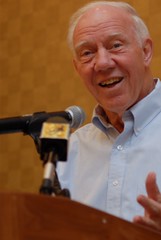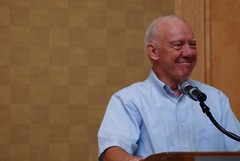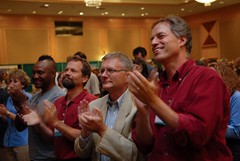In the closing address of the 2008 Pro Walk/Pro Bike Conference in Seattle on Friday, bicycling’s Grand Man in Congress, Jim Oberstar, shared a history of America’s bike movement, and inspired the assembled crowd with his trademark energy and bravado.
For nearly two decades, Oberstar (D-Minnesota) has been one of bicycling’s most effective champions. He was present at the inception of the modern bike movement in the late 1980s when he began to lay the groundwork for ISETEA (the Intermodal Surface Transportation Efficiency Act) in 1991. Prior to that transportation bill re-authorization, Oberstar is credited with laying the groundwork of the bike movement’s presence on the national political stage.
In his address, Oberstar recalled how he urged advocacy leaders of the need to create a “structure” and a “seat at the table” for the bike lobby in Washington;
“We’ve got to create a framework within which bicycling will endure beyond this particular reauthorization. We need a focal point. We need a seat at the table of transportation for bicycling.”
Oberstar recalled how, in 1990, he faced indifference on Capitol Hill to some of his ideas; “I couldn’t get them to add the language I wanted to the bill”. So, being a crafty politician, he leveraged his Chairmanship of the Aviation Subcommittee to surreptitiously “thread in” small pieces of bike-related legislation into the bill;
“We got this little piece in, we got that little piece in, and pretty soon we had this structure, and the road gang [how he refers to the highway lobbyists] didn’t know it had happened…and the bill passed and the money [for bikes] started flowing.”
Oberstar’s efforts had a huge impact on federal spending on bicycle infrastructure. In 1971-1991 (prior to ISETEA), $40 million had been spent collectively by all states on bicycling facilities, but in the six years following the passage of ISETEA, Oberstar said that nearly a half-billion dollars had been spent;
“That’s over 25,000 bike lane miles across America; bike clubs rose up across the country; we had a bike coordinator in every state…”
But even then, Oberstar recalled, he and others had to work on the sly. One of his early efforts to improve bicycling, he said, was done by widening the shoulders of roadways,
“But doing it in the name of needing more width for snowplows in the winter…
“Why all these subterfuges?, because the road gang didn’t want their money to go into bicycle facilities.”
By the time the Association of General Contractors did catch on, it was too late; “By then,” said Oberstar, “I was the senior Democrat on the committee and I said, ‘I’m not going away, so just get used to it.'”.
“We don’t have to work behind the scenes, we don’t need subterfuges, we’re going to do these things!”
And he didn’t go away. He was instrumental in garnering $612 million for the Safe Routes to School program in the last transportation re-authorization (SAFETEA-LU in 2005) and, with new allies in Congress, a more mature bike lobby, and another re-authorization effort looming, he’s now pushing harder than ever.
To continue the success, Oberstar recognizes that he and others in Washington will need the support of the grassroots. In his speech, he remarked that, “It takes a village to raise a transportation program” and he credited a “citizen movement” (led by many of the people in the room) with having made such strides for bicycling of late.
One of those strides he pointed to was the success of the Freewheelin’ bike-sharing program at the recent National Conventions in Denver and St. Paul.
Speaking about that program, he couldn’t resist a jab at the Republican party. He told a story about how they wanted to charge $5,000 to park the Freewheelin’ tent in front of the convention (the Democratic party allowed it for free);
“The ride is free, the bike is free, Humana and Quality Bicycle Products are underwriting it… I knew they were cheap, but that’s carrying it too far.”
So, what’s next for the bike movement in Washington D.C.? More money and more power.
“I’m Chairman,” Oberstar roared to thunderous applause, referring to his position in the House Transportation and Infrastructure Committee, and then added,
“I don’t have to go and bend an ear and ask anybody… we don’t have to work behind the scenes, we don’t need subterfuges, we’re going to do these things!”
Oberstar promised that the new transportation bill is, “going to be a big, robust program,” in the neighborhood of a $450-500 billion “investment in the future of transportation” that will include, “a large slice for bicycling [but he reminded the crowd that he’ll need their help to make that happen]”.
He also announced his plans to establish an Office of Livable Transportation in the Federal Highway Adminstration and said his staff is already working on ways to “facilitate the designation of bicycling as a mode of transportation in each state.” (That effort was spurred by a situation in Illinois where a bicyclist sued the state for not maintaining the bridge and the judge threw out the lawsuit because he decided the cyclist didn’t have legal standing because he’s not an official mode of transportation.)
“I want your ideas, work on it… You’re not petitioners anymore. You have a seat at the table of transportation, and when we get this all done, we will be on the verge of a bicycling century… we’ll convert America from a hydrocarbon society to a carbohydrate society and we’ll be on our way!”
It was re-assuring to see Oberstar at full health. Back at the National Bike Summit in March, he was hobbling after receiving major hip surgery. 1,074 miles on his bike later, Oberstar (an avid cyclist even at 74 years-old) looks as healthy as ever.
And, just in case anyone thinks this bulldog for bicycling is running out of steam, he ended with this gem; “I’ve got news for the other political party, it’s a 45-year hip!”





